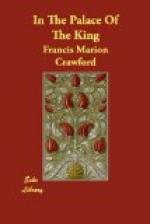“A man would die for you, and wish he might die twice,” he answered, standing upright, as if a weight had been taken from him and he were free to breathe.
She looked up at the pale, strong features of the young fighter, who was so great and glorious almost before the down had thickened on his lip; and she saw something almost above nature in his face,—something high and angelic, yet manly and well fitted to face earthly battles. He was her sun, her young god, her perfect image of perfection, the very source of her trust. It would have killed her to doubt him. Her whole soul went up to him in her eyes; and as he was ready to die for her, she knew that for him she would suffer every anguish death could hold, and not flinch.
Then she looked down, and suddenly laughed a little oddly, and her finger pointed towards the pens and paper.
“She has left something behind,” she said. “She was clever to get in here and slip out again without being seen.”
Don John looked where she pointed, and saw a small letter folded round the stems of two white carnations, and neatly tied with a bit of twisted silk. It was laid between the paper and the bronze inkstand, and half hidden by the broad white feather of a goose-quill pen, that seemed to have been thrown carelessly across the flowers. It lay there as if meant to be found, only by one who wrote, and not to attract too much attention.
“Oh!” he exclaimed, in a rather singular tone, as he saw it, and a boyish blush reddened his face.
Then he took the letter and drew out the two flowers by the blossoms very carefully. Dolores watched him. He seemed in doubt as to what he should do; and the blush subsided quickly, and gave way to a look of settled annoyance. The carnations were quite fresh, and had evidently not been plucked more than an hour. He held them up a moment and looked at them, then laid them down again and took the note. There was no writing on the outside. Without opening it he held it to the flame of the candle, but Dolores caught his wrist.
“Why do you not read it?” she asked quickly.
“Dear, I do not know who wrote it, and I do not wish to know anything you do not know also.”
“You have no idea who the woman is?” Dolores looked at him wonderingly.
“Not the very least,” he answered with a smile.
“But I should like to know so much!” she cried. “Do read it and tell me. I do not understand the thing at all.”
“I cannot do that.” He shook his head. “That would be betraying a woman’s secret. I do not know who it is, and I must not let you know, for that would not be honourable.”
“You are right,” she said, after a pause. “You always are. Burn it.”
He pushed the point of a steel erasing-knife through the piece of folded paper and held it over the flame. It turned brown, crackled and burst into a little blaze, and in a moment the black ashes fell fluttering to the table.




